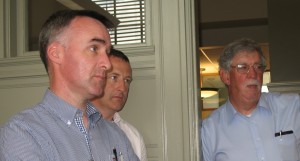Last week I had the pleasure of bringing 3 colleagues from Ireland’s extension service

Kevin Connolly and James McDonnell, Teagasc, discuss the finer points of chattel loans with Alan Curler, VT Ag Credit Corp.
around Vermont. They are part of Teagasc, an Irish organization that is similar to our Land Grant college system. I studied last year with James, Fintan and Kevin, financial management specialists, when I was on sabbatical study leave in Ireland.
During the week we visited with lenders from USDA’s Farm Service Agency, VT Ag Credit Corporation, and Yankee Farm Credit. Several concepts came up that were very interesting to ‘the lads’ and may help the reader understand ag lending here in Vermont.
1. Each of the lenders talked about a ‘relationship’ with the farm borrower. They called it one of the Five Cs of Credit (see the second page of this article). Borrowers often have a difficult time understanding this, until they have a couple of years of borrowing experience- then they see how important it is to be able to pick up the phone, or send an email to their lender about a certain situation. ‘The lads’ from Ireland said that ‘relationship’ is out the window in their country. It evaporated a few years ago when Irish banks took a direct hit with the bad economy. They miss it- a lender can’t go out on a limb for a farmer who has had a little slip, and the lender knows the farmer will be able to make it right in a year or so. A farm lender sits on the opposite side of the table when a farmer wants to borrow money. But the farmer does not see the lender when the lender is trying to get approval for the farmer’s loan from the loan committee.
2. Each of the lenders talked about ‘Chattel Loans.’ This is making a loan for livestock or equipment (or another asset) using the livestock or equipment at partial collateral for the loan. Lenders in Ireland do not do this anymore. After the Irish economy hit the skids a few years ago, one of their banks had to hire people in the US, and on 2 other continents to try and find the large construction equipment that had been sold (illegally) and moved. The lenders do not want to go through that again. So farmers in Ireland are facing very strict lending rules and regulations. Ireland, as part of the European Union, is under the EU’s Dairy Marketing Quota, that has limited the amount of milk that a farmer can sell since 1984. In the spring of 2015, this quota ends. The Irish government wants an expansion of dairy- this is a product that can be easily exported to bring much-needed cash into the Irish economy. Irish dairy farmers are looking to expand to make more profits. Irish farmers who have not been dairying are considering dairy, since it has been the most profitable sector of the Irish economy. Not having Chattel Loans makes this more difficult.
3. Each of the lenders also talked about Guaranteed Loans. USDA’s FSA can guarantee farm loans made by other lenders. This protects the lender in case the borrower cannot repay the loan. This encourages lenders to make loans. Some lenders (like VACC and Yankee, and some private banks) understand how this works and use the guarantees, others do not understand. Several years ago in the economic downturn in Ireland, one bank failed, and the government decided to rescue other banks. ‘The lads’ did not think that the average person in Ireland would be in favor of guaranteed loans at this time.
4. Yankee Farm Credit is a cooperative, owned and run by farmers who have loans from Yankee. (Yankee also provides various financial services to farmers- members and non-members alike.) There is no coop farm lender in Ireland, but there are credit unions. While we were visiting with people at Yankee in White River Junction, one of ‘the lads’ thought that maybe local Irish credit unions would be interested in and able to lend to area farmers for chattel loans.
These were just a few of the ideas on their list to bring back to Ireland. In a few weeks, I hope to share what is going on in Ireland with farm business plans.
